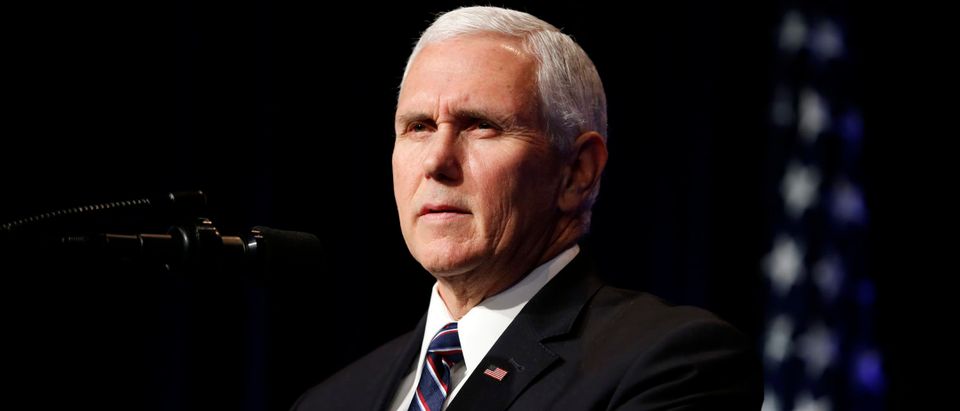Of all of the people and organizations who long to turn back the clock to before the Trump presidency, the Chinese government has to rank among the top. But Beijing just got another reminder that the salad days of Washington taking Beijing for its word on any serious matter are long gone.
On Friday, Vice President Mike Pence sat down at the White House with Anson Chan, a key voice and symbol of Hong Kong’s freedoms and relative autonomy. When Britain returned the colony to China in 1997, the Chinese government agreed to preserve the city’s freedoms under a “one country, two systems” formula.
The remarkable Chan has great credibility as a pro-democracy figure and woman leader who rose to be the top civil servant in Hong Kong under both British and Chinese rule. She likely could have been elected as Hong Kong’s chief executive had Beijing not broken its pledge to allow free election for that office — one in a long and ever-growing list of illegal infringements of Hong Kong’s autonomy.
Pence’s decision to meet with Chan is highly significant. It shows that even while the Trump administration is negotiating a major trade agreement with China, and even as it presses Beijing to keep up pressure on North Korea to disarm, it will not ignore Beijing’s overall misconduct or accept that the Chinese Communist Party is the sole voice of the people of China.
Furthermore, the meeting indirectly reflects the holdup in trade negotiations with China, which continue this week with U.S. Trade Representative Bob Lighthizer and Treasury Secretary Steve Mnuchin heading to Beijing for talks on Thursday. The Trump administration is driving a harder bargain with Beijing than it has faced in recent decades. Specifically, the administration is insisting that the specter of high U.S. tariffs remain on China until it demonstrates that it is fulfilling any pledges it will make as part of a yet-to-be-completed deal.
In other words, this is not the Reagan-era “trust but verify” contradiction that the United States had with the Soviet Union when it came to agreements. Instead it is “distrust and verify.”
Beijing’s violation of an international agreement over Hong Kong helped bring us to this point. China’s government has reneged on its 1984 agreement with Britain and violated the 1990 Basic Law that paved the way for the handover.
More recently it has broken the pledges with the United States and others that brought it into the World Trade Organization, as well as agreements to ease non-tariff barriers to trade, cease cyber attacks on U.S. companies, and refrain from militarizing islands it built in the South China Sea.
Somewhere along the way, Washington finally woke up to Beijing’s lies.
At the beginning of the Trump administration, the Chinese thought it would be business as usual where tough talk during presidential campaigns gave way to American accommodation of China after the election. An early summit between Trump and Chinese leader Xi Jinping at Mar-a-Lago in April 2017 heartened the Chinese — and worried some of us on the political team at the State Department that Beijing had pulled another fast one. Amid much hoopla, the parties agree to four broad “pillars” of cooperation. There was to be a working group and a “100-day plan” to remedy unfair trade.
As usual, China’s government was insincere. But in a break from the norm, Washington began to hold Beijing to account.
Trump and his aides began laying the groundwork for tariffs on China. Trump secured a significant increase in military funding and signaled the end of distracting U.S. involvement in sideshow wars elsewhere. He ordered “freedom of navigation” exercises in which the Navy sails through international waters illegally claimed by Beijing. He signed a law facilitating higher-level interaction with Taiwan and is poised to sell a decent number of F-16s to that free island-nation. Last May, Trump rejected a wimpy Chinese trade deal that aides placed before him. And today, his administration is holding firm that a durable trade deal must result in real, verified change in Chinese economic conduct.
Throughout this process, Pence has been a forceful advocate of Trump’s approach within the government and publicly. In a watershed speech last October, Pence recognized that past U.S. wishful thinking that peace and liberty would emerge in China had failed, that China was the major economic and political threat to the free world, and its Orwellian police state is not merely a nightmare for the Chinese people alone.
Pence’s meeting with Chan makes clear that America is not only interested in commercial advantages, but intends to hold Beijing to its word on all international agreements before taking on blind faith that any new commitments are worth the paper on which they are written.
It is also a chance to revitalize attention to the “free versions of China” — namely Hong Kong and Taiwan — which once attracted great attention in Washington but no longer do.
Both places — one a city and the other a de facto independent nation — demonstrate the potential of ethnic Chinese when they are freed from the yoke of communist tyranny. They are an inconvenient counterpoint to the arguments the Chinese Communist Party uses to justify its illegitimate power. And they are useful to the United States because their existence might contribute to the political turbulence that we should hope befalls our chief adversary in the world.
Christian Whiton was a State Department senior adviser in the Donald J. Trump and George W. Bush administrations. He is the author of “Smart Power: Between Diplomacy and War.”
The views and opinions expressed in this commentary are those of the author and do not reflect the official position of The Daily Caller.












